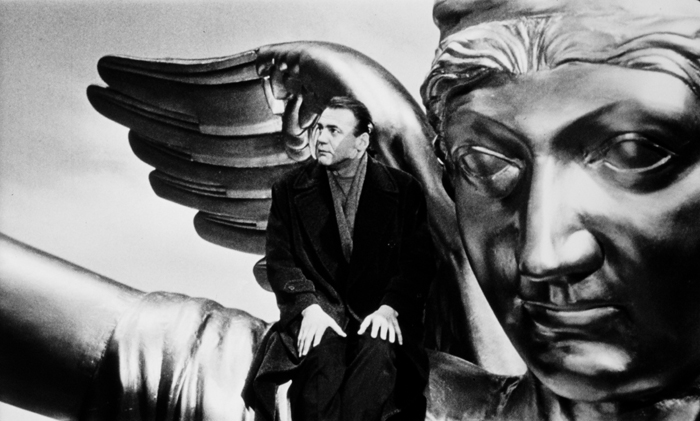Heaven Over Berlin

Images of ponytailed angels patrolling a library, reading the thoughts of scholars; Rilke-inspired interior monologues; Henri Alekan’s gorgeous black-and-white cinematography; a glorious score, rich with cellos and angsty choral music–Wim Wenders mixed these ingredients together for Wings of Desire, his 1987 arthouse classic about heavenly creatures keeping grim watch over late-communist-era Berlin. (PHOTO: BRUNO GANZ; COURTESY OF THE CRITERION COLLECTION)
Wenders made it after an eight-year stint in America, during which he’d scored a hit with Paris, Texas. “I had to rediscover this country of mine through the city of Berlin,” he explains in a 2003 documentary that is one of the extras on the new Criterion Blu-Ray edition.
Wenders wanted the main characters to be people who traveled around the city on a daily basis. He considered mailmen and firefighters before settling on the more poetic idea of angels. Watching the film, you get the sense that Cassiel (Bruno Ganz) and Damiel (Otto Sander) are being punished as they watch over Berlin, and the prologue Wenders wrote in his original script treatment–reprinted in the Blu-Ray notes–confirms this:
“When God, endlessly disappointed, finally prepared to turn his back on the world forever, it happened that some of his angels disagreed with him and took the side of man, saying he deserved to be given a second chance. Angry at being crossed, God banished them to what was then the most terrible place on earth: Berlin.”
Since the end of World War II, Wenders’s prologue explains, the angels “have been imprisoned in the city, with no prospect of release, let alone of being readmitted to heaven. They are condemned to be witnesses, forever nothing but onlookers, unable to affect men in the slightest, or to intervene in the course of history.”
The angels are immortal, invisible, and immaterial; they’re world-weary, despite only half-inhabiting the world we know. So how do we identify with them? In an essay accompanying the new disc, Michael Atkinson suggests that Damiel (Bruno Ganz) and Cassiel (Otto Sander) are, like the viewer, “hypnotized and passive and all too human.” Voyeuristic and largely ineffective, they’re sympathetic in the manner of Jimmy Stewart’s recuperating photographer in Rear Window. But “if Hitchcock’s film was about the anxiety of viewing,” Atkinson notes, “then Wenders’s is about its melancholy, its beauty, its final limitations.”
Those constraints are the reason Damiel decides to trade weightless immortality for a fleeting, sensory experience of life on earth. Wenders imagined Cassiel would join him, but ended up cutting those scenes and later developing them for a sequel, Faraway, So Close. He also excised the pie fight that was, somewhat bizarrely, meant to serve as the film’s final scene. It was the right decision, he reflects in the audio commentary. It wouldn’t be quite right for this pair of sad guardians to have their angel food and eat it, too.
Wings of Desire is available now on Criterion Blu-Ray.






